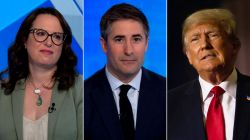Former President Donald Trump and his movement are posing new challenges to accountability, free elections and the rule of law, ushering in a fresh period of political turmoil.
Trump dropped his clearest hint yet Saturday of a new White House run at a moment when he’s on a new collision course with the Biden administration, the courts and facts.
Trump never really went away after losing reelection in 2020, but a dizzying catalog of confrontations is vaulting him back into the center of US politics. It’s likely to deepen polarization in an already deeply divided nation. And Trump’s return to the spotlight probably means next month’s midterm elections and the early stages of the 2024 presidential race will be rocked by his characteristic chaos.
Controversies that are coming to a head underscore that the nation and its political and legal systems are still far from dealing with and moving on from the shock and awe fallout of Trump’s turbulent single White House term. GOP Rep. Liz Cheney, the vice chair of the House select committee investigating January 6, 2021, alluded to that reality when she said on Sunday that the panel wants to avoid Trump turning his potential testimony into a “circus.”
Those controversies also show that given the open legal and political loops involving the ex-President, a potential 2024 presidential campaign rooted in his claims of political persecution could create even more upheaval than his four years in office.
And while fierce differences are emerging between Democrats and Republicans over policy on the economy, abortion, foreign policy and crime in the 2022 midterms – while concerns about democracy often rank lower for voters – there is every chance the coming political period revolves mostly around the ex-President’s past and future.
A flurry of controversies is coming to a head
Trump is, for instance, now locked in a subpoena showdown with the House committee investigating the January 6 insurrection. More and more Trump aides are being brought before a grand jury as the Justice Department gets closer to a fateful decision over whether to charge the ex-President over the mob riot.
In a separate probe, the department is investigating whether Trump broke the law by hoarding highly classified information at his Mar-a-Lago resort. Any prosecutions of the ex-President and those around him would set off an extraordinary political conflagration especially if Trump – already the GOP frontrunner for 2024 – is by then a declared candidate for president.
Trump’s men and women are also stepping up their activity. His political guru Steve Bannon, whose own grassroots movement is seeking to infiltrate school boards and local election machinery, is vowing to expose the Biden “regime” in an appeal against a prison sentence handed down last week for defying a congressional subpoena. Trump ally Sen. Lindsey Graham of South Carolina is calling on the Supreme Court to block an attempt to force him to testify in an investigation in Georgia over Trump’s election stealing effort.
In Arizona, one of the ex-President’s favorite candidates, GOP gubernatorial hopeful Kari Lake – a serial spreader of voter fraud falsehoods – is again raising doubts about the election system. “I’m afraid that it probably is not going to be completely fair,” Lake told AZTV7 on Sunday.
There’s a rising prospect next month’s election will install a Republican majority in the House that will effectively mean a return of Trumpism to political power given the hold the ex-President maintains over the House GOP. Some leading “Make America Great Again” Republicans are already speaking of a possible drive to impeach Biden and have already signaled they will use their powers to investigate to rough up Biden for a possible clash with Trump in 2024.
One of the most powerful pro-Trump Republicans, Rep. Elise Stefanik of New York, the party’s number three leader in the House, told the New York Post last week that impeachment of Biden was “on the table.” South Carolina GOP Rep. Nancy Mace, however, told CNN’s Jake Tapper on “State of the Union” Sunday she did not want to see tit-for-tat impeachment proceedings after Trump was twice impeached. She said she was against the process being “weaponized.” But when asked whether Biden had committed impeachable offenses, she said: “That is something that would have to be investigated.”
An already pro-Trump Republican presence in Washington is likely to expand after the midterms. Scores of Trump-endorsed candidates are running on a platform of his 2020 election fraud falsehoods, raising questions over whether they will accept results should they lose their races in just over two weeks.
On another politically sensitive front, the Trump Organization’s criminal tax fraud and grand larceny trial begins in Manhattan on Monday. The ex-President hasn’t been personally charged but the trial could impact his business empire and prompt fresh claims from him that he is being persecuted for political reasons that could inject yet another contentious element into election season. In a separate civil case, New York Attorney General Letitia James, a Democrat, has filed a $250 million civil suit against Trump, three of his adult children and the Trump Organization, alleging that they ran tax and insurance fraud schemes to enrich themselves for years.
Democrats have made their own attempts to return Trump to the political spotlight. President Joe Biden equated MAGA followers with “semi-fascism” and some campaigns have tried to scare critical suburban voters by warning pro-Trump candidates are a danger to democracy.
But raging inflation and spikes in gasoline prices appear to be a far more potent concern before voters head to the polls, which could spell bad news for the party in power in Washington.
An unprecedented political hangover from an ex-president
Trump’s current prominence on the political scene was already highly unusual. One-term presidents typically fade fairly fast into history. But it is a testament to the firm hold he maintains over much of the GOP that he’s still a key player nearly two years after losing reelection. And while there is growing talk about whether his thicket of legal and political controversies could convince some GOP primary voters it’s time to move on, Trump still seems to have plenty of juice.
The ex-President told supporters at a rally in Texas on Saturday regarding the possibility of a new White House bid, “I will probably have to do it again.”
His most immediate clash with the institutions of accountability went to another level Friday when the House January 6 committee issued a subpoena for documents and testimony. Trump has a long history of challenging such requests and of trying to delay or frustrate investigations into his conduct. But the subpoena also raised the possibility that he might opt to testify in order to claim the political spotlight – even though giving evidence under oath could cause him more legal exposure.
Cheney warned on Sunday that Trump wouldn’t be allowed to turn an appearance into a political opportunity.
“It may take multiple days, and it will be done with a level of rigor and discipline and seriousness that it deserves,” Cheney told NBC’s “Meet the Press.”
“This isn’t going to be, you know, his first debate against Joe Biden and the circus and the food fight that that became. This is a far too serious set of issues.”
Trump offered a glimpse of how he might use an appearance before the committee to create a political extravaganza after the panel announced it would send out the subpoena. In a 14-page letter, he made multiple false and debunked claims about election fraud, and lashed out at the panel itself, branding members “highly partisan political Hacks and Thugs whose sole function is to destroy the lives of many hard-working American Patriots, whose records in life have been unblemished until this point of attempted ruination.”
The committee has taken most depositions behind closed doors and on video and used testimony throughout its highly produced presentations. Only its most sympathetic witnesses have appeared in person. While this has helped create a powerful narrative that has painted a picture of shocking derelictions of duty by Trump on January 6, it has also deprived viewers of seeing witnesses under cross examination. This has made it difficult to assess whether the committee’s case would stand up to more rigorous evidentiary requirements in a court of law.
The prospect of video testimony over an intense period of days or hours is likely to be unappealing to the former President because it would be harder for him to dictate the terms of the exchanges and control how his testimony might be used.
This could all become academic anyway. Given the possibility of a Trump legal challenge to the subpoena, the issue could drag on for months and become moot since a possible new Republican House majority would likely sweep the January 6 committee away as one of its first acts.
The panel is debating whether to make criminal referrals of Trump and those around him to the Department of Justice over their actions around January 6. But the most significant potential areas of criminal liability for the ex-President are in the hands of Attorney General Merrick Garland – over the January 6 case and the classified documents storm – and prosecutors in Georgia, who are investigating attempts by Trump and his allies to overthrow the 2020 election in the key swing state.
If there is evidence a crime was committed, Garland would face a dilemma over whether the national interest lay in implementing the law to its full extent or whether the consequences of prosecuting a former commander in chief in a fractious political atmosphere could tear the country apart.
A decision to charge an ex-president running for a non-consecutive second White House term would undoubtedly cause a firestorm. But sparing him from accountability if there’s evidence of a crime would send a damaging signal to future presidents with strongman instincts.
Since everything about Trump’s political career has been unprecedented, it’s hardly surprising that his political reemergence is posing new questions with the potential to further challenge and damage the country’s political institutions.



















